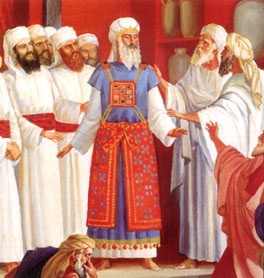This Torah portion gives the laws for the Kohanim, whose Divine service places upon them a particular responsibility to maintain higher standards of righteous behavior and purity.
Leviticus 21:1 And יהוה said to Moses, speak to the priests, the sons of Aaron וְאָמַרְתָּ and you say to them, No priest will be defiled for the dead among his people. C-MATS
Question: What was Moses saying to the Kohen in addition to this command? The Torah cautions adults to regulate their own behavior, because the example they set will have an effect on the children who see them. Chumash
Question: How are the Kohanim different from others? They must be righteous before יהוה. This implies abstinence and is particularly relevant to Kohanim who are forbidden from contaminating themselves from the dead and from marrying certain women. They are servants of יהוה, and for them to neglect or derogate their role is a desecration of יהוה’s Name. The Torah indicates that a Kohen who falls short of righteousness is guilty of desecrating יהוה’s Name. Because a Kohen is the servant of יהוה, he must be scrupulous in his behavior; when he sins, it is regarded by onlookers as a desecration of the One against Whom he transgresses. A similar responsibility applies to all יהוה‘s Chosen People — and especially those who are privileged to be Torah scholars — must hold themselves to higher standards of behavior and ethics. Chumash

